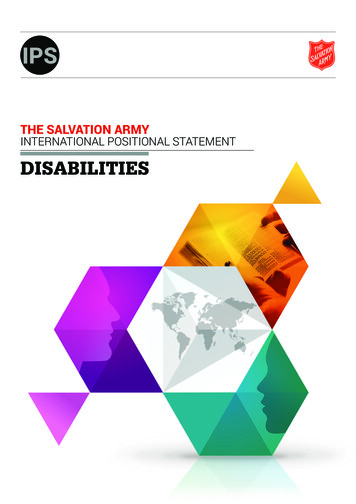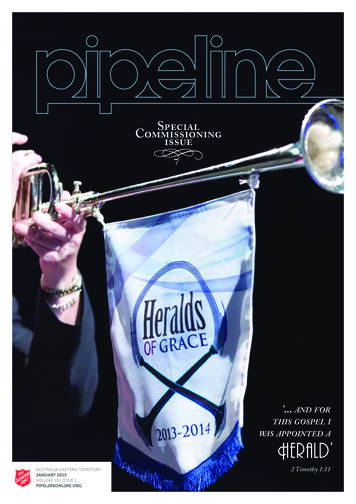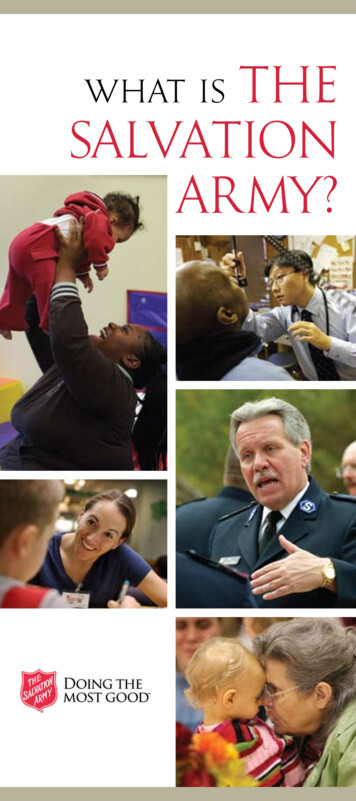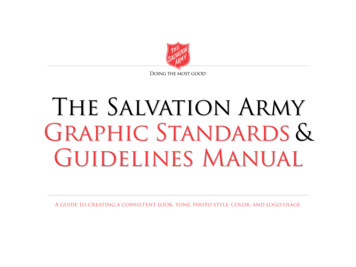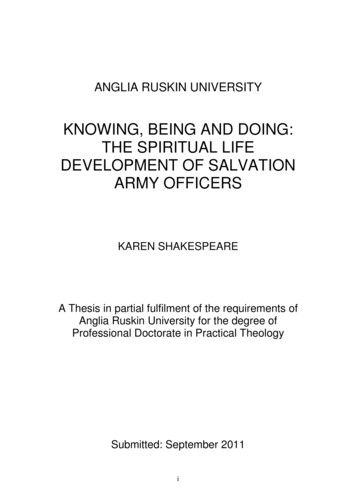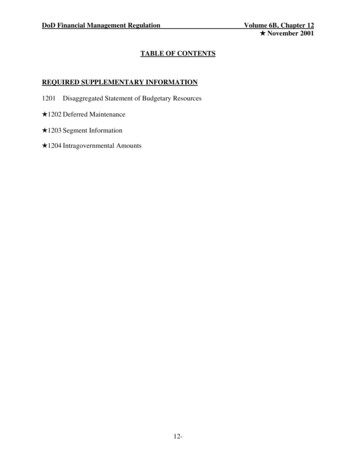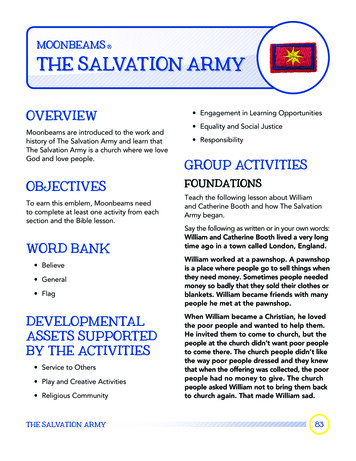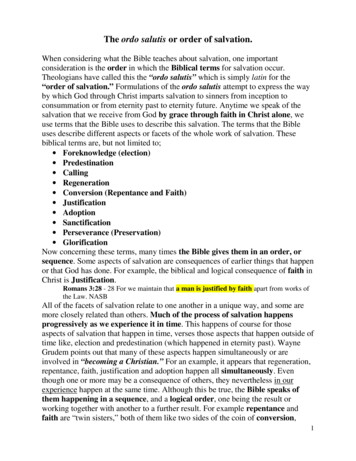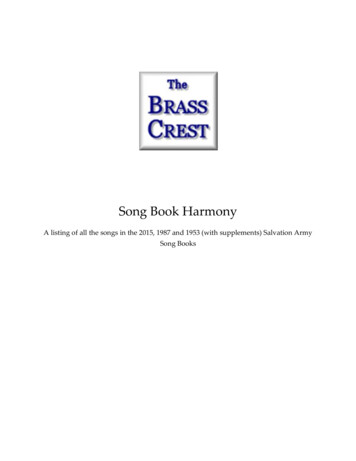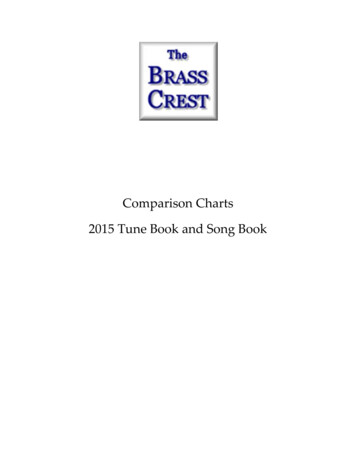
Transcription
THE SALVATION ARMY UNITED KINGDOM TERRITORYWITH THE REPUBLIC OF IRELANDPOSITIONAL STATEMENTALCOHOLAlcohol causes more harm in society than any other addictive drug and the extent of itsimpact is widely underestimated.1 Some health-related consequences of alcohol excess,such as liver disease, are well known, but others, such as increased risk of heart diseaseand many types of cancers, are not.2 There is a strong case to be made that alcoholexcess is the number one threat to public health in the UK.3Heavy drinking carries a risk not only to good health, but also to the security ofemployment and even housing.4 Dependency is not uncommon and creates a downwardspiral of physical, psychological and social harm.The negative effects of alcohol extend beyond the individual. Alcohol excess causes harmto others – for example, through increased violent crime, road traffic accidents, domesticviolence and child abuse.5 It also causes significant harm to society as a whole, throughincreased family breakdown, antisocial behaviour, absenteeism and increased pressureon policing and health services.Despite this level of harm, alcohol excess is endemic and considered by many to benormal.6 The Salvation Army believes that excessive use of alcohol in society should notbe accepted as normal behaviour.Alcohol consumption has risen sharply over recent decades.7 This is explained in part bythe proven link between affordability and consumption and the sale of cut-priced alcohol inshops and venues.8 Recent years have also seen an increase in supermarket sales, homedelivery and extended licensing hours. As a result alcohol is more affordable and moreavailable than ever before.Health bodies and many charities share these concerns and call for an appropriate,evidence-based response.9 However, in the face of opposition from the drinks industrywith its substantial resources and aggressive lobbying, such calls for action have largelybeen ignored. It is in this context that The Salvation Army seeks a biblical understandingand an appropriate response.The Bible teaches that all people are created in the image of God and have unique andintrinsic value.10 Accordingly The Salvation Army promotes the welfare of the body, mindand spirit.11 It is the experience of Salvationists that holistic wellbeing (fullness of life) ispossible without the need for mind-altering drugs.12Drinking alcohol is not sinful in itself but the Bible warns that self-indulgence and excess isdangerous in many aspects of life.13 Drinking alcohol in order to experience its intoxicatingeffects is condemned in Scripture, which highlights both the harmful effects of alcoholexcess and the destructive consequences of intoxication.14The Bible also teaches that where an activity or behaviour becomes a problem for anotherperson, a responsible and compassionate response is to abstain from that behaviour. 15Therefore The Salvation Army promotes abstinence as a rational response to the risks ofdrinking and as a loving choice in response to alcohol-related suffering. All soldiermembers of The Salvation Army demonstrate this alcohol-free lifestyle as a positive lifechoice. In their abstinence they stand in solidarity with those who struggle with alcoholdependency and those affected by alcohol abuse. In support of this, The Salvation Armywill continue in the intentional provision of alcohol-free spaces.1
Whilst drinking in moderation is widely held to be socially acceptable, there is goodevidence that no level of drinking is risk free.17 Consequently, whilst The Salvation Armydoes not require abstinence of adherent members, it still counsels towards limitedconsumption.18 In this, The Salvation Army recognises the value of self-control as apersonal attribute and a gift of God.19Calling on its own history and a contemporary understanding of the effects of alcohol, TheSalvation Army endorses the use of effective interventions (locally, nationally and globally)to reduce consumption and protect public health.20 In particular, it supports legislativemeasures to reduce the affordability, availability and promotion of alcohol.21 Recognisingthe destructive effects of alcohol on innocent bystanders and vulnerable groups, TheSalvation Army also supports interventions that protect children and young people,prevent unwanted pregnancies and address domestic violence.22Identifying with the call of Jesus to love our neighbour, and in particular to stand with thepoor, vulnerable and oppressed, The Salvation Army will continue to care for individuals,families and communities affected by alcohol.23 With its position of abstinence, and itspresence in the local community, The Salvation Army is well placed to combatalcoholrelated harm on a pastoral, practical and societal level.Professor David Nutt, former government chief drug adviser, and other members of theIndependent Scientific Committee on Drugs published a study in The Lancet in November2010: ‘Drug harms in the UK: a multicriteria decision analysis’ (Volume 376, Issue 9752).In it, 20 drugs were rated using 16 criteria addressing harm to the individual and to others.Crack cocaine was rated as the drug most harmful to the individual. Alcohol was rated asthe drug most harmful to others, and when combining the scores, the most harmful drugoverall – more harmful than crack or heroin.1The ALICE RAP project (Addictions and Lifestyles in Contemporary Europe – ReframingAddictions Project), co-financed by the European Commission, brings together around200 scientists from more than 25 countries and 29 different disciplines. Their first briefingpaper, Alcohol - the neglected addiction, 2012, also concludes that alcohol is Europe’s‘most dangerous drug’.2Lesser-known health consequences of heavy drinking:One in fourteen cancers are caused by alcohol - Alcohol, the neglected addiction, ALICERAP, 2012.Drinking heavily increases the risk of coronary heart disease (heart attacks and angina) by1.7 times, doubles the risk of having a stroke, and increases the risk of high bloodpressure by a factor of four. The scale of alcohol-related harm, Department of Health,2007.The World Health Organisation estimates that, in the developing world, alcohol isresponsible for 1 in 20 strokes. The World Health Report 2002. Reducing Risks,Promoting Healthy Life, WHO, Geneva, 2002.In 2011/12 there were an estimated 1.2 million hospital admissions in England related toalcohol consumption, more than twice the number of 2002/03. Health First; An evidencebased alcohol strategy for the UK, Alcohol Health Alliance, 2013.In 2004 a World Health Organisation study found that in Europe, alcohol is the singlebiggest cause of disease and disability amongst those aged 15-79 (ahead of tobacco,obesity and high blood pressure). Risk Factor Estimates for 2004; Attributable standardDALYs, WHO, 2004.32
Reducing harmful drinking is a key priority of The Department of Health as announced inMarch 2013. The London Health Improvement Board, established by Andrew Lansley,also lists alcohol misuse as one of its top priorities for early action to protect the health ofLondoners (alongside cancer and obesity).One important Salvation Army study found a high prevalence of alcohol abuse amongsthostel residents, peaking in the 18- to 25-year-olds at 66%. Seeds of Exclusion, TheSalvation Army, 2009.45Regarding harm to others:47% of victims of violent crime believed the perpetrator was under the influence ofalcohol. The Crime Survey of England and Wales, ONS, 2012.In 2012, drink driving accounted for 6,680 reported road traffic accidents and 290 fatalities(17% of all reported road fatalities). Reported Road Casualties in Great Britain: Estimatesfor accidents involving illegal alcohol levels, Department for Transport, 2012.A Home Office study of male domestic violence offenders in England found that 49% hada history of alcohol abuse. Domestic violence offenders: characteristics and offendingrelated needs, Gilchrist et al. The Home Office, 2003.2.6 million children in the UK live with parents who drink hazardously. 705,000 live withdependent drinkers. New estimates on the number of children living with substancemisusing parents. Manning et al. Journal of Public Health, 2009.Alcohol plays a part in 25-33% of known child abuse cases. Alcohol Harm ReductionStrategy for England, Cabinet Office, 2004.Each week, 26% of men and 17% of women drink at hazardous levels. General LifestyleSurvey, ONS, 2012.6UK alcohol sales, expressed in litres of pure alcohol per adult, were estimated at 9 litresin 1975 and rose steadily to reach double figures in 1997. Consumption peaked in 2004 at11.5 litres before dipping to 9.5 litres in 2011. This dip is explained by a gradual decreasein on-licence sales (ie, alcoholic drinks sold in pubs and clubs). Off-licence sales(supermarkets and shops) continue to rise steadily. Statistical Handbook 2012, BritishBeer & Pub Association, 2012.7Health First is an important report speaking into public policy with regards to the harmcaused by alcohol. It was produced under the auspices of the Alcohol Health Alliance andis endorsed by over 70 UK health bodies including the British Liver Trust, The RoyalColleges of Physicians, The Royal College of Nursing, The Royal Society for PublicHealth, Cancer Research UK, The British Medical Association and Alcohol Concern. It iswritten purely out of concern for public health and community safety and with noinvolvement from the drinks industry. See chapter three for an excellent discussion of theevidence regarding alcohol pricing, affordability and consumption. Health First; Anevidence-based alcohol strategy for the UK, University of Stirling, 2013.89Ibid.‘Then God said, “Let us make mankind in our image, in our likeness, so that they mayrule over the fish in the sea and the birds in the sky, over the livestock and all the wildanimals, and over all the creatures that move along the ground.” So God created mankindin his own image, in the image of God he created them; male and female he createdthem.’ Genesis 1:26–2710‘Do you not know that your bodies are temples of the Holy Spirit, who is in you, whomyou have received from God? You are not your own ’ 1 Corinthians 6:19113
‘Do not get drunk on wine, which leads to debauchery. Instead, be filled with theSpirit ’ Ephesians 5:1812‘The thief comes only to steal and kill and destroy; I have come that they may have life,and have it to the full.’ John 10:10‘ nor thieves nor the greedy nor drunkards nor slanderers nor swindlers will inherit thekingdom of God.’ 1 Corinthians 6:1013‘Do not join those who drink too much wine or gorge themselves on meat, for drunkardsand gluttons become poor, and drowsiness clothes them in rags.’ Proverbs 23:20-21The Bible sometimes refers to wine symbolically as a blessing or a gift from God(Deuteronomy 7:13; Amos 9:14). In his first miracle, Jesus created large quantities of finewine for a wedding party (John 2). However, the nature of wine and attitudes towards itsdrinking then were very different from today. Care must be taken not to misrepresentthese texts as an endorsement of drinking to ‘unwind’ or ‘loosen up’, drinking to relieveemotional strain or distress, or more obvious excess.14Biblical warnings regarding excess alcohol consumption and intoxication:‘Who has woe? Who has sorrow? Who has strife? Who has complaints? Who hasneedless bruises? Who has bloodshot eyes? Those who linger over wine, who go tosample bowls of mixed wine.’ Proverbs 23:29–30‘Woe to those who rise early in the morning to run after their drinks, who stay up late atnight till they are inflamed with wine. They have harps and lyres at their banquets, pipesand tambourines and wine, but they have no regard for the deeds of the Lord, no respectfor the work of his hands.’ Isaiah 5:11–12‘Let us behave decently, as in the daytime, not in carousing and drunkenness, not insexual immorality and debauchery, not in dissension and jealousy.’ Romans 13:13‘The acts of the flesh are obvious: sexual immorality, impurity and debauchery; idolatryand witchcraft; hatred, discord, jealousy, fits of rage, selfish ambition, dissensions,factions and envy; drunkenness, orgies, and the like. I warn you, as I did before, thatthose who live like this will not inherit the kingdom of God.’ Galatians 5:19–21‘Do not get drunk on wine, which leads to debauchery. Instead, be filled with the Spirit ’Ephesians 5:18‘For you have spent enough time in the past doing what pagans choose to do – living indebauchery, lust, drunkenness, orgies, carousing and detestable idolatry. They aresurprised that you do not join them in their reckless, wild living, and they heap abuse onyou.’ 1 Peter 4:3-4‘So whether you eat or drink or whatever you do, do it all for the glory of God. Do notcause anyone to stumble, whether Jews, Greeks or the church of God.’ 1 Corinthians10:31-3215‘If your brother or sister is distressed because of what you eat, you are no longer acting inlove. Do not by your eating destroy someone for whom Christ died.’ Romans 14:15‘It is better not to eat meat or drink wine or to do anything else that will cause your brotheror sister to fall.’ Romans 14:2116 AllSalvation Army premises, including LifeHouses, operate an alcohol-free policy.17 Alcohol– the neglected addiction, ALICE RAP, 2012.4
The Salvation Army offers two forms of membership. A person becoming an adherentmember makes a simple statement of faith and wishes to identify with a local SalvationArmy centre as their place of worship. Those who wish to become a soldier member mustaccept 11 statements of belief and make various commitments about how they wish to livetheir life, including abstinence from alcohol, tobacco, gambling and ‘all else that couldenslave the body or spirit’. The Articles of War, The Salvation Army.18‘But the fruit of the Spirit is love, joy, peace, forbearance, kindness, goodness,faithfulness, gentleness and self-control. Against such things there is no law.’ Galatians5:22–2319Alcohol – the neglected addiction, ALICE RAP, 2012.Health First; An evidence-based alcohol strategy for the UK, University of Stirling, 2013.20In the late 19th Century, The Salvation Army was ahead of its time in recognising andresponding to the individual and societal harm caused by alcohol. Its early influence inpromoting abstinence and rescuing dependent drinkers led to significant and violentopposition from local publicans and breweries.One particular threat is the increasing use of new media for the promotion andmarketing of alcohol. The Salvation Army seeks to advocate for the monitoring andregulation of this new challenge to public health.2122Alcohol, The Seeds of Exclusion and The Salvation Army, The Salvation Army, 2011.‘Jesus replied: ‘”Love the Lord your God with all your heart and with all your soul andwith all your mind.” This is the first and greatest commandment. And the second is like it:“Love your neighbour as yourself.”’ Matthew 22:37–3923‘The Spirit of the Lord is on me, because he has anointed me to proclaim good news tothe poor. He has sent me to proclaim freedom for the prisoners and recovery of sight forthe blind, to set the oppressed free, to proclaim the year of the Lord’s favour.’ Luke 4:18–19‘“For I was hungry and you gave me something to eat, I was thirsty and you gave mesomething to drink, I was a stranger and you invited me in, I needed clothes and youclothed me, I was ill and you looked after me, I was in prison and you came to visit me.” The King will reply, “Truly I tell you, whatever you did for one of the least of these brothersand sisters of mine, you did for me.”’ Matthew 25:35–36, 40‘But he wanted to justify himself, so he asked Jesus, “And who is my neighbour?” In replyJesus said: “A man was going down from Jerusalem to Jericho, when he was attacked byrobbers. They stripped him of his clothes, beat him and went away, leaving him half-dead.A priest happened to be going down the same road, and when he saw the man, hepassed by on the other side. So too, a Levite, when he came to the place and saw him,passed by on the other side. But a Samaritan, as he travelled, came where the man was;and when he saw him, he took pity on him. He went to him and bandaged his wounds,pouring on oil and wine. Then he put the man on his own donkey, brought him to an innand took care of him. The next day he took out two denarii and gave them to theinnkeeper. ‘Look after him,’ he said, ‘and when I return, I will reimburse you for any extraexpense you may have.’ Which of these three do you think was a neighbour to the manwho fell into the hands of robbers?” The expert in the law replied, “The one who hadmercy on him.” Jesus told him, “Go and do likewise.”’ Luke 10:29–37All Bible quotations are taken from the New International Version 2011 (UK) edition.APPROVED FEBRUARY 20155
Salvation Army also supports interventions that protect children and young people, prevent unwanted pregnancies and address domestic violence. 22 Identifying with the call of Jesus to love our neighbour, and in particular to stand with the poor, vulnerable and oppressed, The Salvation Army will continue to care for individuals, .
